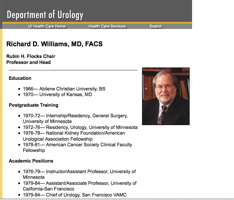
|

Dr. Richard D. Williams on Prostate Cancer Treatment
Richard D. Williams. M.D., is a professor and head of the Department of Urology at the University of Iowa. He sits on the editorial board of Urology, Urologic Oncology, Journal of Surgical Oncology and Urology Times and has held numerous offices in professional organizations. Here, he addresses the aspects of treatment that many men fear and offers advice on what types of treatment are available.
In the best-case scenario involving radical prostatectomy, the man will never ejaculate again. Why not?
In the male, at the time of ejaculation the bladder neck closes and the ejaculate is forced out the penis. In patients who have had their prostate removed, there is no ejaculation from the seminal vesicles or the vas deferens because they’ve been removed. The orgasm is a dual thing–both something in the brain and something with ejaculation. The psychic event in the brain still occurs but the ejaculation does not. The sensation of pleasure still happens.
Why is there a danger of impotence with radiation and brachytherapy?
Because the nerves that preserve erections are damaged by direct radiation and subsequent fibrosis. The chances of preserving erections are better with surgery. If you’re trying to save the nerves for erection, 70-80% of patients who have surgery will maintain functional erections. In radiation, it’s about 60% who retain erections, depending on the dose of radiation.
Is the loss of the ability to have an erection immediate with radiation?
If you lose erection from surgery it will be immediate and may take up to 12 to 18 months to return if nerve-sparing surgery is successful. If you have radiation nothing changes for 3 to 6 months, or up to a year, and then your ability to have an erection declines. It’s exactly the opposite of surgery.
Surgery, radiation and brachytherapy are the big three. Is there anything new?
If we’re talking about treatment of organ confined disease, the only other two things to consider are cryotherapy and high-intensity focused ultrasound (HIFU). HIFU is not approved in the US yet. Cryotherapy is approved but the long-term data is not out. I’m not impressed with the available data. It has fewer side effects in some patients, but I’m not very enthusiastic about it.
In cryotherapy doesn’t the cold damage the nerves too?
Absolutely. The percentage of patients having erections after cryotherapy is even lower than with either radiation or surgery. A lot of people tout cryotherapy, and I’m not saying it doesn’t work, but we don’t have long-term data to prove it is equally curative as XRT or surgery, and it has more side-effects.
What is robotic surgery?
The robotic approach involves smaller incisions, which helps reduce blood loss, and it reduces the time the patient may have to have a catheter in. Patients view the robotic approach as something quite positive, and the outcomes of surgeons who have done many are pretty good, but they’re not necessarily better than open surgery. When you look at the data comparing open surgery to robotic surgery, there’s not a lot of difference.
Surgery seems like such a reliable choice. Why doesn’t everyone opt for that?
The side-effects of surgery, such as incontinence, drive people crazy. All the treatments have some side-effects, but having to wear four or five pads a day to keep yourself from staining your clothes is bothersome. It doesn’t happen all that often – only one or two percent who have radical prostatectomy in competent hands will have total incontinence, and that tends to be older patients. Between 90 and 97% of my patients don’t have to wear pads at all.
Do Kegel exercises help reduce the problem of incontinence?
Kegel exercises are isometric exercises that involve clamping down on urethral muscles. We have patients do this several times a day. I have them start before surgery. There’s good evidence it works. I can’t prove this, but I believe there’s also a psychological benefit to Kegel exercises because the patient feels he’s taking a prominent role in his own recovery.
About Dr. Richard D. Williams
Richard D. Williams is a professor and head of the Department of Urology at the University of Iowa. He sits on the editorial board of Urology, Urologic Oncology, Journal of Surgical Oncology and Urology Times and has held numerous offices in professional organizations.






Hello
My name is veart(single). I was impressed when i saw your profile today at and i will like to establish a long lasting relationship with you. In addition,i will like you to reply me through this my private e-mail box(veartwani@ymail.com)
Thanks
waiting to hear from you soon.
veart
I will send to you my pictures in my next mail through this my mail box
veartwani@ymail.com